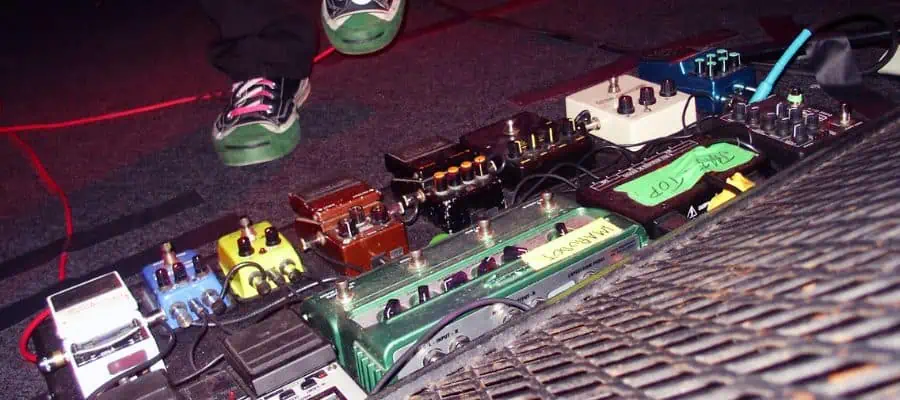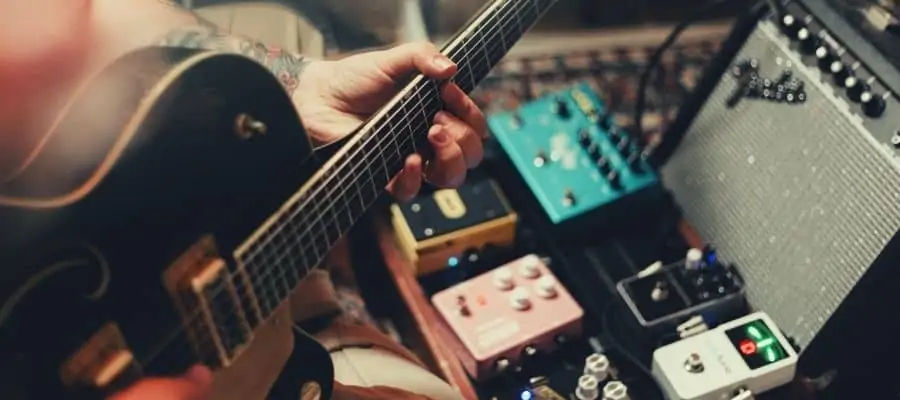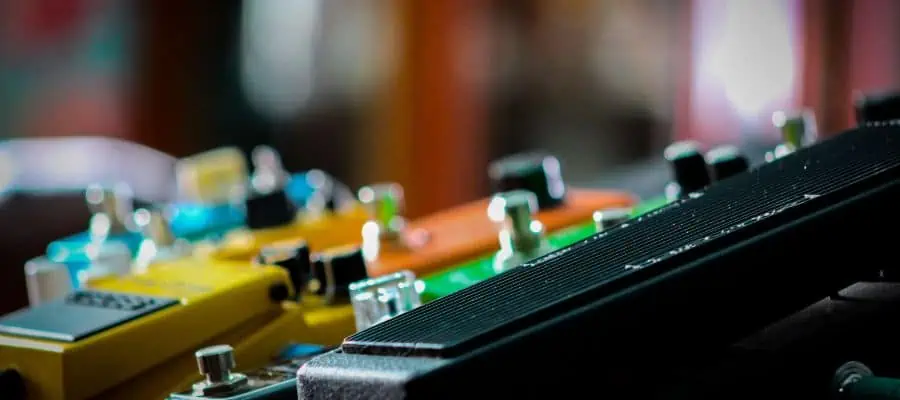As the creative catalysts of guitarists, guitar pedals transform the pure guitar signal into a wide range of tones. From distortion to reverb and delay pedals, they all offer a different color to shape your tone. For guitarists looking to create different tones to experiment in different genres and with different sounds, guitar pedals stand as an invaluable kit. But are they good investments in general?
Guitar pedals are great investments for guitarists after sonic exploration and versatility. As pedals can deploy you with a wide range of effects, they can add layers of depth to performances by sculpting guitar tones as desired.
That being said, you should be aware of impulsive pedal purchases and getting too obsessed and exaggerated with gear. While quality pedals most probably would retain their value if you want to sell them at some point, the same does not go for all pedals. Second-hand, low to mid-range pedals use significant value. So, their worth will ultimately depend on your creativity and commitment to using them.
In this article, I will talk about pedal prices and try to go deeper into the question of whether they are a good investment or not.
Guitar Pedals as a Financial Investment

A guitar pedal, most often, is not a good financial investment at all, as there is a significant price gap between new guitar pedals and second-hand guitar pedals. High-end unique guitar pedals retain their value most of the time, but still, there is a gap between new and second-hand ones.
If you buy a second-hand guitar pedal, though, it does not matter if it is low-end or high-end; you can resell it close to the price you purchased. Of course, for it to not lose value, you have to take care of it well, avoiding aesthetic as well as internal damage.
On the other hand, there are some exceptions. Suppose you, by any chance, buy a unique pedal that later becomes a “vintage” or desirable because of any reason, like limited production or a trend that makes the pedal popular. In that case, the price of your pedal may go significantly higher than its original value.
For example, the overdrive pedal by Boss, OD-1, was sold for around $20 when it came out around the early 90s. At the time, they were not popular pedals, and they were considered outdated. However, today, these pedals are vintage collectibles and are sold for up to 10 times their initial price.
Another example is the Boss Heave Metal 2 HM-2 pedal. It came out around the mid-90s and was not that popular back then. Later, this distortion pedal became the tonal center of Swedish Death Metal because of its evil tone. Again, these pedals are rare today and can be found for 5 to 10 times higher than their original price.
While there are rare examples like the aforementioned pedals, these are not to be trusted to justify pedals as good financial investments. Pedals are good investments in terms of your musical journey, but financially, they will make you lose money almost all the time.
Guitar Pedals as a Musical Investment

As musical investments, guitar pedals are great choices, as they help you sculpt your tone in different ways to play different genres and push the limits of your creativity. From distortion to reverb, from delay to modulation pedals, there are tons of choices out there to increase your tonal versatility and expand your musical horizons.
When you can modify and shape tones as you want, you can add more emotion and depth to your music. You can add depth to your solos, create atmospheric landscapes, and/or build more character for your rhythm sections. For instance, genres like shoegaze, ambient, and experimental are heavily shaped with the guitar tone in the center.
That being said, as technology has advanced and analog pedals are not the only way to create effects anymore, there are many budget-friendly pedals offering great performances. For as low as $20 to $30, you can find great-sounding pedals made in East Asia, which are copies of popular high-end pedals.
Of course, if you have a bigger budget to invest, you can go for better-sounding, more reliable, popular pedals, but the performance difference between them has been smaller in recent years. On the other hand, a professional ear can detect the differences in seconds.
In this sense, for musical creation, guitar pedals are well worth their prices and can help guitarists get motivated, play in different genres, create various sounds, and add more sonic layers to their sound.
But a point of consideration is that sometimes the temptation to buy more and more pedals gets too much. Building a big pedalboard can be expensive, and you must always remember that, actually, pedals are not for collection. Their worth depends on your commitment to use them. If you find yourself buying a pedal each week or looking to upgrade your pedals constantly before getting the most out of them in the first place, you have to stop yourself and focus more on playing and creating new ones with what you already have.
How do you create an income with guitar pedals?

If you are keen on investing in guitar pedals, the best way to build an income is to buy a bunch of them at a discounted price from a retailer and sell them individually slightly below the market price. The profit you get from an individual sale won’t be that high, but by selling tens of pedals, you may create a decent income.
However, this strategy also comes with problems, such as selling online, platform commissions, shipping fees, etc. As I am not a businessman but a musician, I do not have enough information on creating a business out of guitar pedals. But there are some people trying it, and you can find quite a lot of info on the web on how to follow this strategy.
Guitar Pedals vs Plug-ins

Plug-ins, which work like software guitar pedals, are dominating the market these days, thanks to the advancements in digital sound replication. Plug-ins work on your smart device or computer, to which you can connect your guitar and create a digital pedalboard just like a physical one to reach a wide range of tones.
Plug-ins are slightly more affordable than physical guitar pedals, and there are many free choices that you can download and use as a standalone software or with a DAW to shape the tones you like.
It is a good choice for guitarists who like to play through their computers or smart devices. With a MIDI foot controller, you can perform easily with plug-ins and the tones you created just under your feet on the stage.
There is a huge debate as there are some guitarists who prefer the sound of analog devices and some who are okay with digital emulations. This is a matter of personal taste. So, you have to listen and decide for yourself.
Conclusion
Ultimately, guitar pedals are well worth the investments in musical terms. For financial reasons, they are far from being the best gear to go with. They can push your sonic versatility limits, help you get motivated, and sculpt many different tones to play different genres, which is immensely valuable for any guitarist. So, the value of guitar pedals does not lie in their price but in how they serve you to be a better musician.
If you found this article useful, you may want to save this pin below to your Guitar board.

Recent Posts
Some guitarists insist on buying an expensive amplifier with their electric guitar. They assume that this is a must for every type of guitarist out there. However, in some situations, this isn’t...
Top 50 Free Realistic Guitar VST Plugins With Sound Examples
As technology has rapidly advanced in the recent decade, computers are stealing more and more roles from physical musical instruments and accessories. Nowadays, you do not need expensive amps,...

